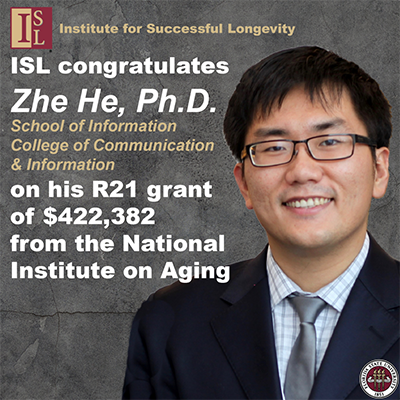Zhe He wins $422,382 grant from National Institute on Aging

The National Institute on Aging/National Institutes of Health has awarded Zhe He of the School of Information a $422,382 grant to develop tools researchers could use to gauge the potential to generalize results of their planned clinical studies.
His project will address the problem created by overly restrictive eligibility criteria used in many studies, which often leads to many subgroups, such as older adults, being excluded from the study samples.
He and his multidisciplinary team intend to develop a toolbox of validated methods to assess generalizability of planned studies. This will allow researchers opportunities to reconsider their selection/disqualification criteria and to make adjustments needed to recruit more representative groups of individuals.
“We hope this project can help clinical investigators choose and use appropriate methods with well-vetted statistical and informatics tools to improve the generalizability of results from clinical studies to real-world patients,” He said.
He’s two-year study, “Systematic Analysis of Clinical Study Generalizability Assessment Methods with Informatics,” is funded through the NIH Exploratory/Development Research Grant Program (R21). This is He’s first federal research grant.
Working with He as a principal investigator will be Dr. Jang Bian of the Department of Health Outcomes & Biomedical Informatics in the College of Medicine at the University of Florida.
The project’s co-investigators are:
- Neil Charness, Department of Psychology and director of FSU’s Institute for Successful Longevity.
- William Hogan, Department of Health Outcomes & Biomedical Informatics, College of Medicine, University of Florida.
- Yi Guo, Department of Health Outcomes & Biomedical Informatics, College of Medicine, University of Florida.
- Thomas J. George, Division of Hematology and Oncology, College of Medicine, University of Florida.
“I am so grateful to the Institute for Successful Longevity for providing us with a planning grant to conduct and publish preliminary studies on this research,” said He, a Faculty Affiliate of the institute. “I am also grateful to the National Institute on Aging for funding this important project at our first attempt.”












